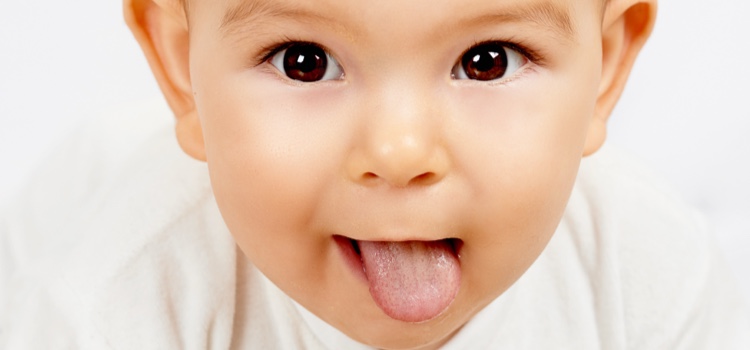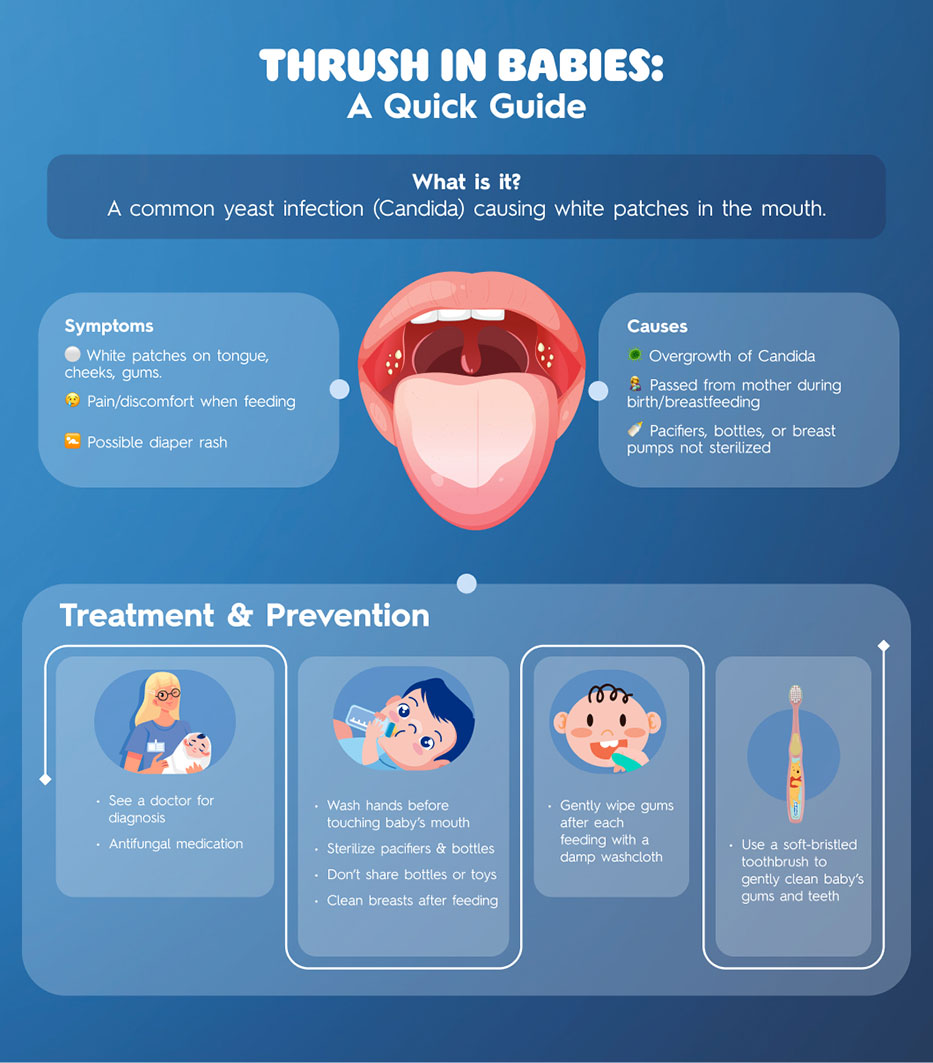Thrush in Babies: Causes, Symptoms, and Treatment

Summary
Key Takeaways
- Oral thrush is caused by the overgrowth of the fungus Candida albicans.
- Appears as white, cottage cheese-like sores on the inside of the mouth.
- Sterilize pacifiers, bottle nipples, and breast pump parts after each use to prevent the spread of oral thrush.
- Gently clean your baby's gums, tongue, and teeth after each feeding to help remove bacteria.
- Visit a healthcare professional for proper treatment.
Table of Contents

Approved and reviewed by Dr. Gans, a dental professional of over 10 years.
LEARN MORE >Key Takeaways
Health concerns are certainly common when it comes to the well-being of your little one, and that includes conditions such as oral thrush in babies. Here's what you need to know about thrush in babies, what it looks like, and how we can help you navigate through the issue.
What is Thrush in Babies?
Thrush in babies' mouths, or oral thrush, is a common yeast infection that can be caused by a variety of reasons. Usually seen in newborns or young infants, oral thrush appears as white patches or lesions on the gums, inner cheeks, and tongue, that are caused by an overgrowth of the Candida fungus.
Although these white spots or sores may seem alarming, there are steps to take to help treat and even fight off the infection.

What Causes Oral Thrush in Babies?
Thrush in babies is usually caused by a fungus or yeast known as Candida albicans. According to the Nationwide Children's Hospital, Candida is a naturally present fungus in the mouth and body and is often considered to be harmless. However, with the right conditions, an overgrowth of the fungus can lead to oral thrush in babies.
Common risk factors that can cause a baby to develop thrush in the mouth can include:
- Weakened immune system makes your little one more susceptible to infection
- Passed during birth if mother has a yeast infection
- Breastfeeding with an untreated yeast infection
- Long use of a pacifier or bottle without frequent cleanings
- Improperly sterilized breast pump
- Premature birth or low weight
- Antibiotic medications to treat bacterial infections, killing of bacterial infections which can lead to an overgrowth of candida in the mouth
- Yeast infection on the mother's nipples, which can pass to the baby during feeding
It's important to know that candida can be passed on from person to person. Make sure to limit the sharing of bottles, toys, or pacifiers between little ones to reduce the risk of your baby developing thrush in the mouth.
If you or your little one is diagnosed with thrush, it's best that you both get treatment at the same time, since it can spread between you or to other members within the household.
Signs and Symptoms of Thrush in Babies?
Oral thrush typically goes away with the right treatment and is often not considered to be a serious condition. However, oral thrush can cause some discomfort.
Common signs of thrush in babies include:
- White lesions or sores that can appear on the tongue, inner cheeks, gums, and roof of the mouth.
- Pain when eating or swallowing, causing some babies to not want to feed.
- If you gently wipe the white patches and they aren't removed easily, or the area becomes red underneath, then your baby may have oral thrush.
Treatment of Oral Thrush in Babies
Common and usually not serious with the proper treatment, oral thrush in babies usually clears up after about 5 days. For proper treatment and diagnosis, visit your healthcare provider.
If your child is diagnosed with oral thrush, according to Nationwide Children's Helping Hand™ guidelines, your healthcare professional may recommend:
- An antifungal medication in the form of a syrup or pill. One common liquid medication for the treatment of oral thrush, especially in infants, is nystatin. The medication often comes in drops and is placed on each of the inner cheeks inside the baby's mouth using either a sponge or syringe to apply it.
- An antifungal cream for rashes in the diaper area. Since thrush is caused by a yeast infection of candida, there are certain topical skin creams that your medical provider may recommend. The most common diaper rash treatments are nystatin, miconazole, clotrimazole, and ketoconazole. In other cases, a steroid ointment with hydrocortisone may need to be applied.
How to Prevent Thrush in Babies
As stated by the NHS, often affecting newborns and young toddlers, thrush in babies' mouths is often caused by an overgrowth of the fungus known as Candida albicans. There are a few measures you can take to limit the growth of the fungus:
- Seek Out a Pro: If you suspect that your little one has developed oral thrush, it's important to visit your pediatric healthcare professional right away for proper diagnosis and treatment.
- Liquids are Important: Keep your child hydrated for an additional layer of immune support.
- Practice Good Hygiene: Always wash hands before and after touching your baby's mouth.
- Keep It Clean: Sterilize pacifiers, bottle nipples, and breast pump parts after each use.
- Limit the Spread: Do not share bottles, cups, or toys.
- Breast Care: If breastfeeding, clean each breast after each feeding, see your healthcare provider for proper treatment.
- Focus on Oral Hygiene: Wipe baby's mouth gently with a clean, damp cloth or use a soft-bristled toothbrush specifically designed for babies for tender gums. This may not prevent oral thrush, but it can help keep it in check while helping to support a healthy smile for your little one.
- Balanced Diet: Keep your baby on a balanced diet, especially when introducing solids to help support a healthy immune system.
- Personal Diet Considerations: If breastfeeding, consider adding yogurt or another probiotic to your daily diet to help maintain both yours and your baby's bacterial balance.
Caring for Your Baby's Smile
Typically, maintaining a good oral hygiene routine for your little one can help create an environment that is less ideal for the overgrowth of candida to occur, thus reducing the risk of your child developing oral thrush.
Your child's smile is our priority. There are a few additional things you can do to help keep your baby's mouth healthy. When caring for your baby's mouth, be sure to:
- Use a damp washcloth to gently wipe gums after each feeding to better remove leftover debris and plaque, to help keep your baby's mouth in good condition.
- Gently clean your baby's gums and teeth with a soft-bristled toothbrush designed for babies 0-2, that's equipped with extra-soft bristles for gentle cleaning and massaging baby's teeth and tender gums. Some options also include an ergonomic, non-slip handle designed for parents' hands for easier brushing.
- Start to floss your little one's teeth as soon as two teeth are touching to help remove any trapped food debris and plaque.
- Make sure to visit a pediatric dental professional as soon as that first baby tooth comes in or by their first birthday. Your dental professional will provide a cleaning and offer any personalized recommendations to help keep your little one's teeth and gums healthy.
In addition to limiting the risk of thrush in the mouth, a proper oral care routine is key to keeping your baby's smile healthy and bright. Be sure to brush your child's teeth until the age of 6 to help them learn and develop good brushing habits early on, as the foundation of oral care can last a lifetime.
Oral thrush is just one of many bumps you may encounter as you navigate parenthood. And you're not alone—many parents and caregivers are bound to face similar concerns as well. With the right care at home and the aid of a pediatric healthcare professional, thrush can be resolved.
Kid's Oral Care Recommendations
Complete Your Child's Oral Care Routine
- Brush your baby's tender gums and teeth with a soft-bristled toothbrush for baby ages 0-2 twice a day for two minutes each session
- Switch to an electric toothbrush once your child is 3 to remove more plaque for healthy teeth and gums such as the Oral-B Kids Electric Toothbrush for kids ages 3+ featuring Disney and Marvel characters.
- Encourage healthy habits with the Disney Magic Timer App which helps kids brush up to 2X longer.
- Visit their dental professional twice a year for professional cleanings and checkups.
Equip your kids' oral care routine with the toothbrush, toothpaste, and mouthwash that's right for them.
FAQs
-
How can you tell your baby has thrush?
-
What does thrush in babies look like?
-
How do babies get rid of thrush?
-
How long does thrush in babies last?
-
Is thrush in babies contagious?
-
Is oral thrush an STD?
Sources
- https://www.cincinnatichildrens.org/health/t/ thrush#:~:text=Thrush 20is 20usually 20treated 20with,if 20the 20spots 20are 20gone
- https://kidshealth.org/en/parents/thrush.html
- https://www.mountsinai.org/health-library/diseases-conditions/thrush-in-newborns
- https://www.nationwidechildrens.org/ conditions/thrush
- https://www.nationwidechildrens.org/-/ media/nch/family-resources/helping-hands/documents/hhi117.ashx
- https://www.news-medical.net/health/Treating-and-Preventing-Oral-Thrush.aspx#:~:text=Brushing 20regularly: 20The 20teeth 20should,of 20sugar 20in 20their 20saliva
- https://www.nhs.uk/conditions/oral-thrush-mouth-thrush/
- https://www.nhs.uk/conditions/baby/ breastfeeding-and-bottle-feeding/breastfeeding-problems/thrush/#:~:text=If 20either 20you 20or 20your,can 20easily 20spread 20between 20you
- https://www.nhs.uk/conditions/thrush-in-men-and-women/#:~:text=Thrush 20is 20not 20classed 20as,This 20can 20happen 20if
- https://www.nhs.uk/medicines/nystatin/side-effects-of-nystatin/
- https://ufhealth.org/conditions-and-treatments/diaper-rash#:~:text=Nystatin 2C 20miconazole 2C 20clotrimazole 2C 20and,if 20these 20medicines 20will 20help
Table of Contents
- What is Thrush in Babies?
- What Causes Oral Thrush in Babies?
- Signs and Symptoms of Thrush in Babies?
- Treatment of Oral Thrush in Babies
- How to Prevent Thrush in Babies
- Caring for Your Baby's Smile
- Kid's Oral Care Recommendations
-
- FAQs
- Sources

Approved and reviewed by Dr. Gans, a dental professional of over 10 years.
LEARN MORE >
Sign Up
for expert advice and exclusive offers

Sign Up
for expert advice and exclusive offers

